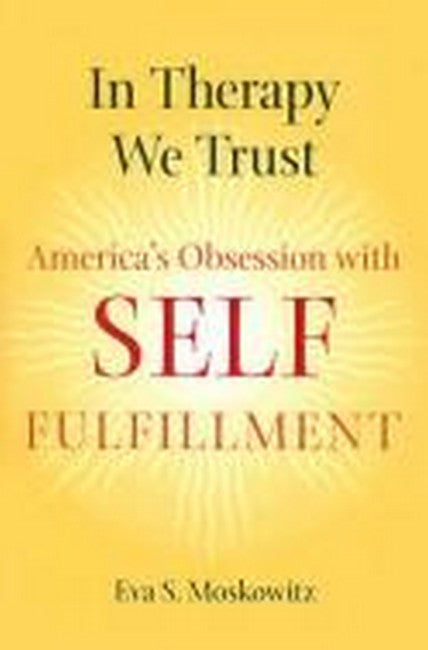From self-esteem talk on Oprah to self-help books like Negaholics and Your Sacred Self, from magazine quizzes that test your ''happiness quotient'' to headlines blaring the supposed deepest emotions of public figureswe live in an age fixated on emotional well-being. Rich or poor, black or white, male or female, straight or gay, Americans share a belief in the therapeutic gospel. Feelings reveal inner truth; salvation lies in self-esteem. We measure success with a psychological yardstick. As Eva Moskowitz argues, Americans today turn to psychological cures as confidently as they once petitioned the Lord with prayer. How did the land of the free become obsessed with self-fulfillment? Has America gained or lost by placing so much emphasis on personal well-being? Taking a historical approach, Moskowitz explores the country's tendency to find psychological explanationsand excusesfor nearly everything. Beginning with the example of a ''Mind Cure'' developed by mid-nineteenth-century clockmaker Phineas P. Quimby, Moskowitz explains how Americans' growing fascination with therapy led them to adopt new kinds of reformincluding, at the turn of the twentieth century, provisions for psychological services in prisons, courts, hospitals, and schools. Depression-era divorce rates prompted colleges and high schools to offer courses on marital happiness and produced a new marriage-counseling industry. During World War II, Moskowitz shows, the army devoted unprecedented energy to a soldier's ''psychological readiness for combat.'' Moskowitz also explores more recent developments, including Cold War-era psychological assumptions of magazine campaigns that targeted unhappy housewives. She confronts the social protest movements in the 60s and the explosion of 70s self-help fads that continue to the present. In a study that encompasses all aspects of American societyfrom television talk shows to the criminal justice system, from office politics to world politicsMoskowitz identifies a debilitating ''sense of self'' that is intimately bound up with the major developments of the twentieth century.Reviews''In this entertaining, informative and provocative cultural analysis, Moskowitz . . . explores how the desire for personal happiness became supreme, and how success in every arena from sports to geopolitics has come to be measured 'with a psychological yardstick' . . . While Moskowitz charts what she sees as the excesses of this cultureOprah and Sally Jesse Raphael's confessional televised therapy fests, and the glut of 12-step programs for everyone from nailbiters to 'dataholics' and information addictsher criticism is as judicious as her careful praise of an encompassing therapy culture.''Publishers Weekly''With an acute attention to Dickensian detail, Moskowitz traces the beginnings of our national therapy jones.''Salon''All of us, rich and poor, black and white, male and female, straight and gay, are part of a cult that worships the psyche, extols feelings as sacred and seeks salvation in happiness and self-esteem. Moskowitz calls this outlook the 'therapeutic gospel.' In Therapy We Trust is her story of how we came under its spell.''Women's Review of Books''In Therapy We Trust, written in admirably plain prose uncluttered by academic jargon, traces the gradual rise of the therapeutic conception to our current apotheosis of self-centered triviality.''Wilson Quarterly''Commentators have long noted the peculiarly American obsession with the psyche and faith in psychological cures. Eva Moskowitz's engaging and comprehensive book examines this phenomenon from its first appearance in the nineteenth-century mind cure movement through to its contemporary manifestations in a wide range of popular and professional venues, from Oprah to Prozac. Surveying such diverse topics as marriage, war, housewifery, social protest, and the expressive self of the 1970s and 1980s, Moskowitz argues persuasively that the therapeutic gospel is not merely a perspective, but rather a program or faith, organized around three tenets . . . Moskowitz's book is a useful antidote to those who would interpret the psychologizing of America as yet another symptom of national decline, rooted in the excesses of the 1960s and the narcissism of the baby-boom generation. The national proclivity for seeking quick and easy therapeutic solutions to intractable social problems has deeper, early-twentieth-century roots that were nourished and sustained by their location in a number of institutional settingscourts, prisons, schools, and hospitals among them . . . Moskowitz is particularly sharp on the many ways in which 1960s social protest movements drew their cues from therapeutic culture even as they attacked its malign conformism.''Journal of the History of Medicine''The first synthesis of the history of the emergence and spread of America's therapeutic cultureand it is a good one . . . [It] should change the way scholars think about the therapeutic . . . Making good use of popular and secondary as well as archival sources, Moskowitz's book reviews the emergence of 'therapeutic agents' (i.e., psychologists, psychiatrists, and professional counselors) in the early twentieth century, their important role in shaping military and federal mental health policy during World War II, and their part in the mass diffusion of increasingly vapid therapeutic prescriptions to the wider public in the postwar period, up to and including the present day.''American Studies International''In Therapy We Trust is a brave and groundbreaking book that will help stir interest and further scholarship in this large and daunting subjectAmerica's fascination with the psychological.''James Hoopes, Babson College

